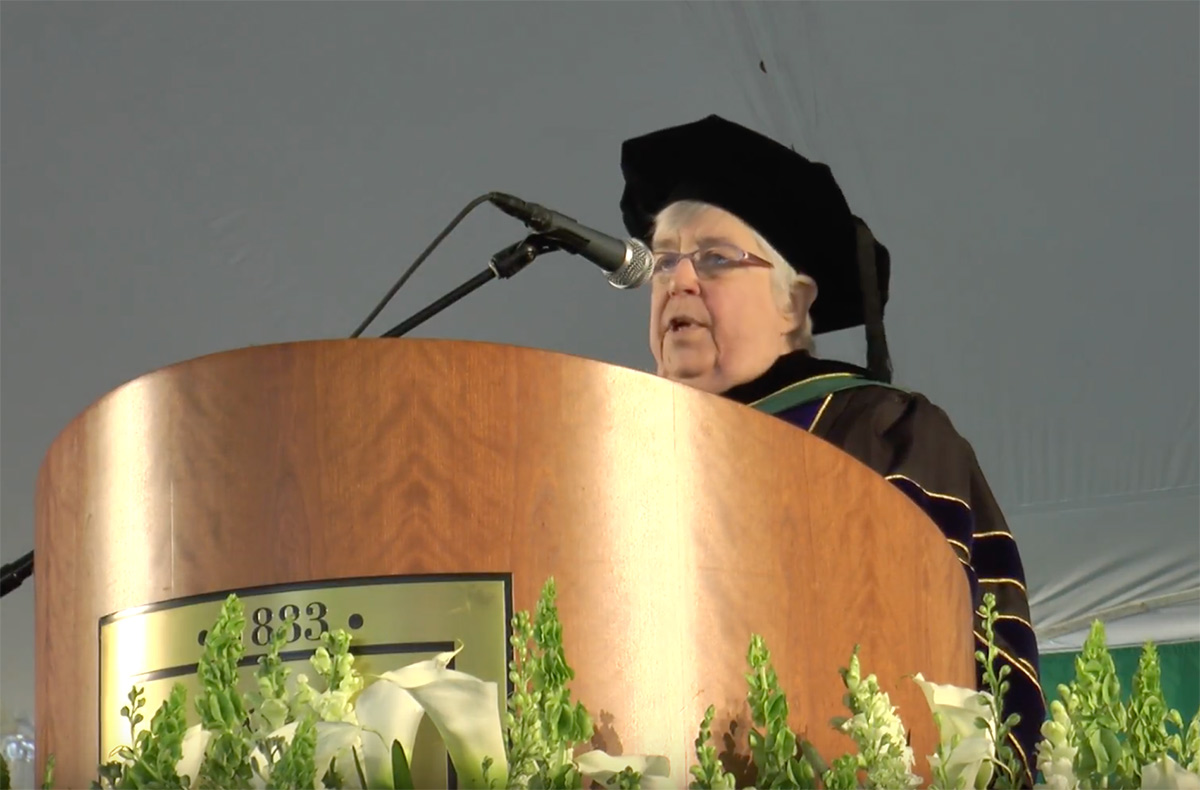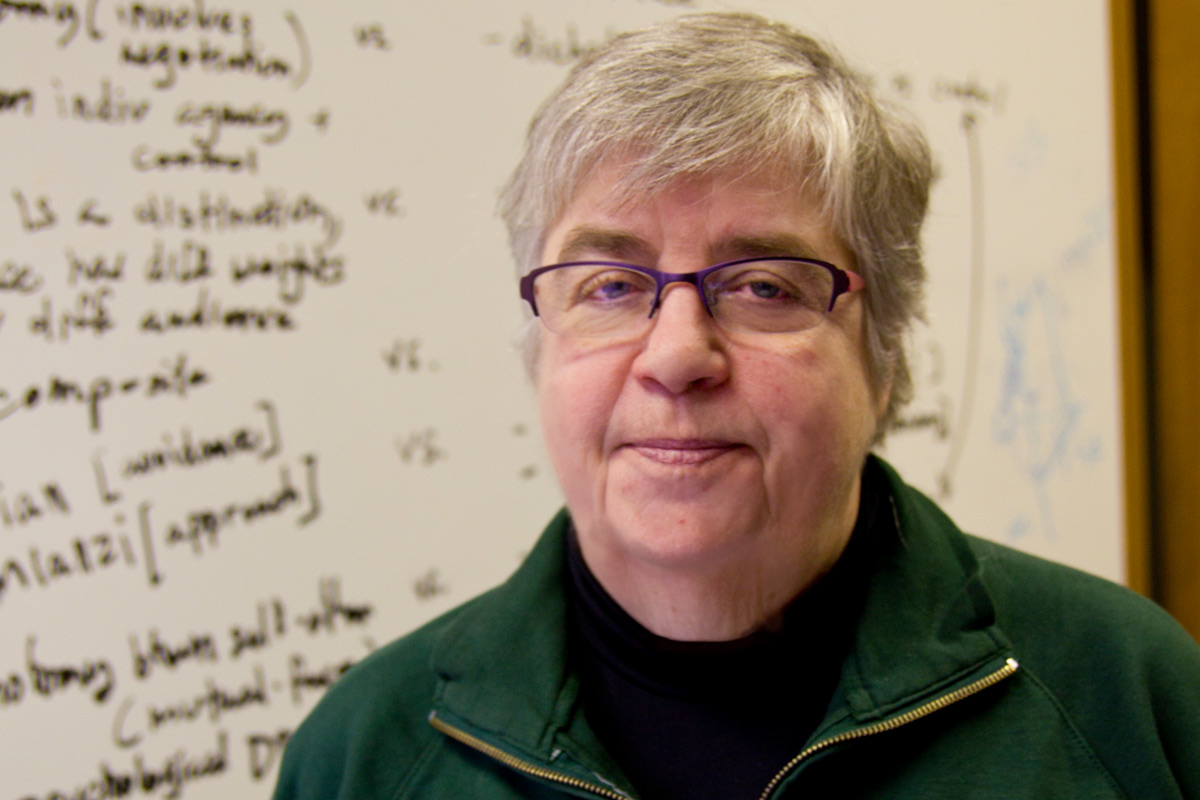It’s such a widely told story about Lee Knefelkamp that it’s become apocryphal: How, a few days before a beloved advisee’s long-planned doctoral dissertation defense, Knefelkamp was carried out of Teachers College on a stretcher, believed to be suffering from a heart attack – yet on the morning of the defense, left the hospital in defiance of her doctor’s advice, went home and took a cold shower, arrived at the defense in time to ask the first question (thus rendering the proceedings official) and then checked herself back into the hospital.
“People told that story all the time,” says Jayne Brownell, Vice President for Student Affairs at Miami University. “And I’d say, ‘That really happened. I was the student.’ And p.s., there’s a little more to the story. As she was leaving, she said, ‘There’s a bottle of Champagne in my office.’”
L. Lee Knefelkamp (the “L.” was for “Lorraine”), Professor Emerita of Psychology & Education, who died in early September, was known for many things. She is credited with bringing the first wave of student development theory to the student affairs profession, shifting the field from service provision to a focus on transforming college campuses into developmental communities.
She spearheaded a national initiative by the Association of American Colleges and Universities (AAC&U) to reshape liberal arts education for the 21st century. With her long-time colleague, W. Warner Burke, she helped create TC’s Eisenhower Leader Development Program (EDLP), a master’s degree program in social-organizational psychology for officers at the U.S. Military Academy at West Point. She defied intellectual categorization, leading highly successful careers as both a dean and a professor, and teaching in two different programs at TC. She also quietly led a customized teaching program for female inmates at a prison in upstate New York.
Lee traveled across disciplines to the question of, ‘what is it that’s to be learned here?’ Her ultimate concern was with the particular student, and was the student learning, for heaven’s sake – and if not, she’d see to that.”
—W. Warner Burke
More than anything, however, Knefelkamp will likely be remembered as a fierce advocate for students – her own, certainly, but also, students as the focus and point of education – and student learning.
“Lee traveled across disciplines to the question of, ‘what is it that’s to be learned here?’” says Burke, E.L Thorndike Professor of Psychology & Education. “Her ultimate concern was with the particular student, and was the student learning, for heaven’s sake – and if not, she’d see to that.”
Knefelkamp was mourned by an extensive and devoted following of former students who channel her thinking and spirit in student affairs positions around the country.
“Lee had a deep and abiding respect for the learning that students go through during their college experience,” said Brownell. “She believed that our responsibility as professionals is to learn from and about our students, see where they are, and help them grow and develop. That means that if you’re a student in my office for a conduct reason or with an unformed opinion, I don’t blame you for thinking the way you do. I think, no, you’re being developmentally appropriate, and I need to meet you there so that you leave having attained your next stage of development. That’s the essence of Lee.”
In the 1970s, the student affairs profession was still primarily service-based, focusing on resume development and other aspects of helping students find jobs. Theorists such as Arthur Chickering (Ph.D. ’58), William Perry, Lawrence Kohlberg and Jean Piaget had advanced theories of moral, ethical, cognitive and intellectual development in college students and other young adults, but without specific reference to how they might be applied by those working with students on campus.
In a 1978 publication titled Applying New Developmental Findings – a special issue of the journal New Directions for Student Services – Knefelkamp, Carol Widick and Clyde A. Parker laid out a framework for translating these ideas into a set of tools for student affairs professionals. They argued that the profession needed a theoretical knowledge base that described the changes that take place in college students and what those changes look like. They called for a model for how development occurs, including the psychological and social processes that cause it; an understanding of how the college environment can influence student development; and consensus on what the goals of development should be.
She connected the theories we talked about in class not just to practice issues in our field but also to larger ideas in the world,” says Christensen. “It was what she called her ‘teaching outside of Jossey-Bass.’ We’d look at an idea from education or psychology through literature– books like Their Eyes Were Watching God – or film. It was incredibly powerful when she did that.”
—Monica Coen Christensen
“Lee changed the field in ways that have endured for 40 years,” says Monica Coen Christensen, Dean of Students at Manhattan School of Music. “Because of her, everyone who gets an M.A. intending to work in student affairs takes a course in student development theory. And in great part because of her, the student affairs profession is now concerned with student life issues and the kinds of environment we create so that students grow and thrive. That can take place in one-on-one encounters with a student, but also in understanding why having student organizations are important, and that residence halls aren’t just a set of beds, but opportunities for creating community.”
In 1985, Knefelkamp, Elizabeth Wells and Rennie Rogers Golec published their practice-to-theory-to-practice (PTP) model, an 11-step conception of how, in essence, student affairs professionals can function as theorists themselves. PTP calls for practitioners to approach their practice as problems in theory; come up with new strategies based on developmental theories; reapply those strategies to practice, and so on, in a continuous cycle of refinement.
“PTP was one of the first theories of what’s our role, what actions do we take in creating environment in which students will flourish,” says Case Willoughby, Vice President for Student Affairs and Enrollment Management at Butler Community College in Pennsylvania. “And that grows straight out of a refrain from Lee’s classes at TC – something she didn’t coin, but that she said a lot. Someone would say, oh, but that’s purely theoretical, and she’d quote Kurt Lewin and say, there’s nothing so practical as a good theory.”
Lee Knefelkamp grew up on a farm in Minnesota and retained a lifelong fondness for horses. Her father was a career officer in the U.S. Navy. She earned a B.A. in literature and humanities studies from Macalester College, where she was deeply influenced by the institution’s emphasis on urban service and global citizenship, and an M.A. and Ph.D. in counseling psychology from the University of Minnesota.
She served in the Peace Corps in Costa Rica from 1968 to 1970. During the 1980s, she traveled extensively with the Harvard developmental theorist William Perry and his wife, Mary, leading seminars designed to enable faculty apply Perry’s insights about students’ intellectual development. Perry’s great contribution, Knefelkamp later wrote, was the recognition that “a fundamental belief in students is more important than anything else,” and that acting on that belief entailed “realistically conceiving the student where he or she is, and at the same time never losing sight of where he or she can be.”
In particular, Knefelkamp was influenced by Perry’s “sense of the positionality of students as they approached learning” – the perspectives acquired from one’s lived life,” including “the influences of gender, race, ethnicity, and socioeconomic class.”

WE NEED YOU NOW That was Knefelkamp's message to graduates of Wagner College last spring.
Prior to joining TC’s faculty, Knefelkamp directed the student development graduate program at the University of Maryland; served as dean of the school of education at American University; and was academic dean of faculty at Macalester College. For the past three decades, she also held the title of Senior Scholar, Office of Integrative Liberal Learning and the Global Commons, for the American Association of Colleges and Universities (AAC&U). In that role, she worked on an initiative called LEAP (for Liberal Education and America’s Promise) – a comprehensive campaign to redesign the academic and social experience for American undergraduates. LEAP’s core goals were to ensure, first, that students gain an understanding of human cultures and of the physical and natural world; and, second, that they use their skills to improve society.
“If AAC&U senior scholars were awarded tenure, Lee Knefelkamp would have earned it long ago,” read a statement on the organization’s website immediately after Knefelkamp’s passing. The statement cited Knefelkamp for “her ability not only to widen the intellectual horizon on educational questions but also to touch the hearts and lives of all those who worked with her.”
Certainly that assessment tracks with how she is recalled by former students.
“She connected the theories we talked about in class not just to practice issues in our field but also to larger ideas in the world,” says Christensen. “It was what she called her ‘teaching outside of Jossey-Bass.’ We’d look at an idea from education or psychology through literature– books like Their Eyes Were Watching God – or film. It was incredibly powerful when she did that.”
Brownell remembers that at the beginning of one course on how adults learn, Knefelkamp asked students to assess their own learning styles using the Kolb Cycle, a tool that maps learning along an experiential spectrum. “After she read our assessments, she came back with a new version of the syllabus, with assignments targeted to our different strengths and weaknesses,” Brownell says. “Certain assignments you had to do using the style you were strongest in, and others in your weakest style. I’d never seen anyone else do that before. She lived what she taught.”
Basically, you came to her with a bunch of threads, you presented it to her, and she handed you back a sweater. And then she taught you how to do it.”
—Case Willoughby
Several people described Knefelkamp as the most brilliant person they’d ever met, with a knack for making others feel more brilliant as well. Willoughby recalls an evening in the late 1990s, when he and another doctoral student ate dinner with Knefelkamp at a restaurant in New York City. “It was an elegant place, but they use to have these white butcher block table clothes and crayons. We were drinking Cosmopolitans and talking about our dissertations, and by the end of dinner, Lee had my dissertation was mapped out on the table cloth. I still have it somewhere in my basement -- I’ve been meaning to frame it, food stains and all.
“Basically, you came to her with a bunch of threads, you presented it to her, and she handed you back a sweater. And then she taught you how to do it.”
